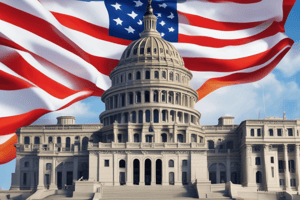Podcast
Questions and Answers
What is the main challenge faced by individual nations in funding robust defenses?
What is the main challenge faced by individual nations in funding robust defenses?
- Consulting strategic studies and economic analyses
- Deploying personnel around the world
- Minimizing the financial burdens on populations (correct)
- Maintaining arsenals of weapons
Why do governments invest heavily in their armed forces?
Why do governments invest heavily in their armed forces?
- To maintain arsenals of weapons
- To ensure national stability (correct)
- To deploy personnel around the world
- To consult strategic studies
What is the significance of classifying national defense as a public good?
What is the significance of classifying national defense as a public good?
- It indicates heavy investment in armed forces
- It minimizes financial burdens on populations
- It ensures national welfare and stability (correct)
- It implies its provision is cost-free
Why can managing the expenses related to national defense be difficult?
Why can managing the expenses related to national defense be difficult?
What insight does recognizing national defense as a public good provide?
What insight does recognizing national defense as a public good provide?
How does understanding the principles behind national defense as a public good promote informed debate?
How does understanding the principles behind national defense as a public good promote informed debate?
Why is national defense classified as a public good?
Why is national defense classified as a public good?
How does national defense exhibit the characteristic of being non-excludable?
How does national defense exhibit the characteristic of being non-excludable?
In what way is national defense similar to security and peace?
In what way is national defense similar to security and peace?
What is the impact of compulsory taxation on reducing free riding behavior in national defense?
What is the impact of compulsory taxation on reducing free riding behavior in national defense?
Why do U.S. citizens who don't support military spending still benefit from national defense?
Why do U.S. citizens who don't support military spending still benefit from national defense?
What distinguishes national defense from resources like food and water in terms of consumption?
What distinguishes national defense from resources like food and water in terms of consumption?
Flashcards are hidden until you start studying
Study Notes
National Defense as a Public Good
To understand why national defense is often classified as a public good, let's dive into its unique features and implications. A public good has two defining characteristics: it's non-excludable—meaning anyone can benefit from it regardless of whether they contribute financially—and non-rivalrous—indicating that one person's consumption does not diminish another's. Let's explore these concepts when applied to national defense, and how this classification impacts our society and government.
National defense is indeed non-excludable because individuals cannot opt out of living within a country's borders. This means everyone benefits, even if some choose not to pay their fair share through taxes. For instance, U.S. citizens who don't support military spending still enjoy protection from foreign threats by virtue of being American citizens.
Moreover, national defense is also non-rivalrous. While resources like food or water may become depleted once consumed, security and peace do not experience diminishing returns with more people benefiting from them simultaneously. In other words, one person's safety doesn't take away from another's.
Another feature associated with public goods is free riders, those who consume a service without contributing towards its costs. As national defense is mandatory and compulsory taxation creates a collective payment system, it helps reduce free riding behavior. However, individual nations must find effective ways to balance the need to fund robust defenses while minimizing the financial burdens on their populations. To address such challenges, governments frequently consult strategic studies, international agreements, and economic analyses.
It's essential to note that classifying national defense as a public good does not mean its provision comes without cost—far from it! Governments invest heavily in their armed forces, maintaining arsenals of weapons and deploying personnel around the world. These expenses translate into real dollars spent, which can be difficult to manage, especially during times of budgetary constraint.
Nevertheless, despite the price tag attached to national defense, recognizing its status as a public good provides valuable insight into its fundamental role in ensuring social welfare, national stability, and global security. By understanding the principles behind this designation, we better appreciate both the challenges inherent in providing such services and the importance of addressing them effectively.
In conclusion, considering national defense as a public good allows us to examine its unique attributes, evaluate its significance in protecting societies, and recognize the tradeoffs involved in securing a nation's interests. Understanding these complexities fosters informed debate over policy decisions while enhancing awareness among citizens regarding their contributions to national wellbeing.
Studying That Suits You
Use AI to generate personalized quizzes and flashcards to suit your learning preferences.



